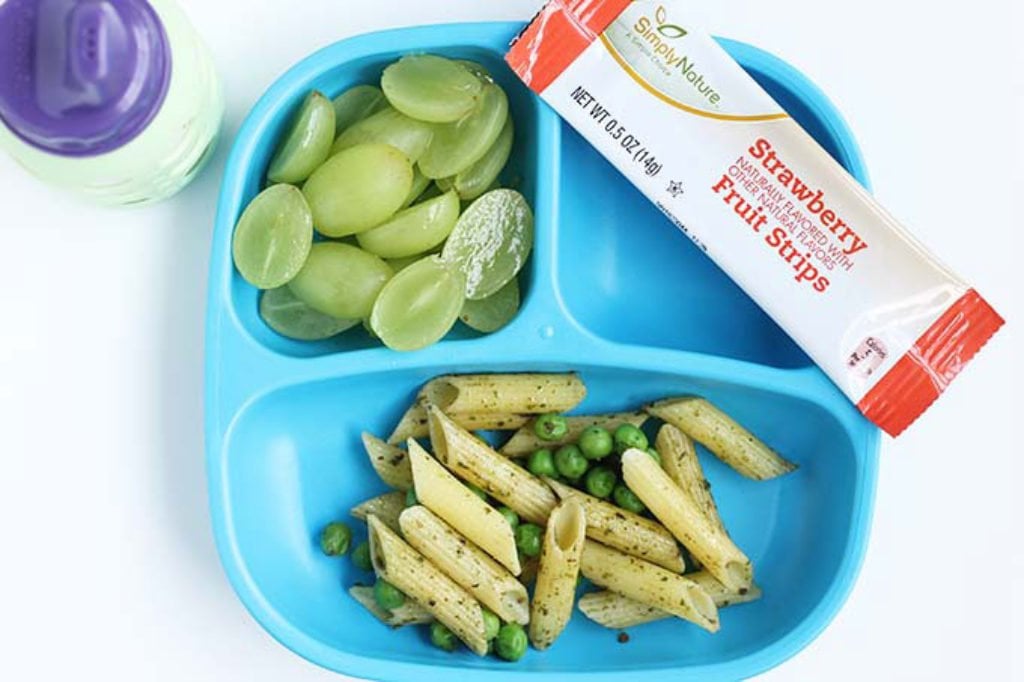During holidays, playdates, or special events, there can be times when unwanted comments pop up about feeding our kids. Whether you have a different philosophy to whether the kids need to clean their plates, you feel like some food is shamed at meals, or you just wonder what to do when a loved one or care provider wants to feed your child differently than you do, this will help.
 Feeding Kids
Feeding Kids
We all don’t approach feeding our kids in the same way, whether we’re of the same or a different generation. And this can be a really emotional and complicated topic, especially around the holidays. I know that it’s happened at my holiday tables and I’ve been a little caught off guard, and it can be even harder to handle when you’re actually staying with family for a longer period of time.
To help, I asked one of my very favorite feeding experts to walk us through it. Jennifer Berry, is an occupational therapist who you can find at Thrive with Spectrum, where she offers Feeding Therapy, Family Meal Time Coaching and a wealth of other resources. I’ll let her take it away now!
“Even when you have found a responsive approach to mealtimes that works for you and your little ones, dining with family and friends can make things even more complicated. When we gather for holidays, birthdays, or family events, we also subject ourselves and our kids to the unwanted comments of family members,” she says. Here are some tips to keep in mind whether for the holidays, any meal with family, or even when it comes to care providers.
1. Remember that You’re the Best Expert on Your Child
“Even if you are in the minority in the way you approach feeding little ones at a family gathering, you as their parents get to decide what the overarching messages you send to your little ones about food and their bodies. You still get to lead the way no matter what those others think or say,” she says.
I love this reminder because so many of us have so much weird stuff about food and our bodies that often comes out during meals. Jenny says that we can use these opportunities as times to help our kids navigate these confusing messages.
2. Redirect the Conversation
“If someone makes a comment about how much or little they eat or tries to get them to eat a food they aren’t wanting, your can often steer the conversation to a healthier place. If someone tries to get your child to finish their carrots before having more rolls, try this: ‘Thanks for trying to help’ to your family member and then to your child ‘You know what buddy, those rolls are delicious, go ahead. I’m going to have another too’.,” Jenny suggests.
This works as a way to acknowledge your child’s desire to enjoy their food AND it gently steers the conversation away from negative comments about intake.
3. Change the Subject
“Changing the subject all together can be helpful. If it feels right, try something like ‘Suzy does great job listening to her body. Also I forgot to tell you about her school play…….’. Sometimes changing the subject with someone who you know isn’t going to see if your way is better than engaging in a debate in front of your child,.” Jenny says.
This is my go-to approach and it’s actually useful when someone says something about the food us adults are eating (or not eating!) too. Ask about their work, their house, a recent trip. Something totally not related to food!
4. Assert Yourself
“Explaining your approach to feeding can be a great idea. Here are some thoughts about doing so in a way that is effective:
- Keep it brief. When we try to explain too much it can seem like we are trying to justify something we already know is right for our families. Getting into the weeds with someone at the holiday table not only is super stressful for you and your kid, but it invites more opportunities for more unwanted comments.
- When a family member won’t stop or wants to challenge you, you can try to shut it down. Try “I’d love to talk to you about this more but not right now”. Or “I know you are trying to help, but please don’t make comments about my child’s body or food choices.”
- Don’t let comments about body size or shape go unchecked. Even if you aren’t ready for a full discussion about feeding approaches it’s important that your child hears something to counteract a negative comment. A simple ‘I love Jamal just the way he is. He’s strong and smart and fun. Let’s go play, buddy!'”, Jenny says.
Maybe you know grandma wants the kids to clean their plates or eat their veggies before dinner. If that happens regularly, think it through ahead of time so you can plan out your response. Or maybe even talk to her about it before the holiday (email or texting are easier if you are nervous about talking face to race) to prevent it from happening in front of the kids.
You could also sit next to your child to make sure you hear any comments, help them get their plate before everyone else sits down, or take the lead on the conversation topic right from the start of the meal. Remember: None of us does this perfectly and we’re all trying to do the right thing. And even if something is really upsetting, this is one day (or a few times out of the entire year) and you get to set the tone every other day. And those repeated messages are the ones that matter most.
A giant thank you to Jennifer Berry for walking us through this tricky subject. You can find more of her work at Thrive with Spectrum, where she offers family mealtime coaching to help even more.


















Thank you for this article. I am wondering if you have suggestions for how to handle the case where it is actually the parents that are disagreeing! My husband and I aren’t seeing eye-to-eye on how to feed our ~1.5 year old and it is causing stress for both of us.
I’m of the “everything in moderation”/intuitive eating philosophy and he is trying to optimize his health (avoiding saturated fats and most animal products, etc.) because he wants to live forever. Given we eat a bit differently from one another, perhaps it isn’t a surprise that we both think our daughter should eat more like ourselves and less like the other. I’d be thankful for any thoughts or resources you have that might help us navigate this.
I think there is a lot of context you’ll have to look at to figure out the best way to proceed.
(And just want to point out that you, too, with your intuitive eating approach, are trying to “optimize your health”:). The book How to Raise an Intuitive Eater is a great book with all of the context if he is open to reading it. If not, you could maybe sit down and meal plan together to try to strike a balance of what you’re offering throughout the week. It will likely be stressful to disagree in the moment at meal times, so perhaps trying to agree on basics (what happens if she asks for something else, what happens if she wants more of something, etc) so you don’t confuse your daughter would help too. I hope that helps some, I know this is hard.
Thank you very much for a very useful article! We are currently spending the holidays with our family and my sister keeps telling my 18 months old toddler things like “yucky, you have broccoli for dinner!”, “you are eating fish, fish is disgusting!” while he’s eating. He is such a good eater, but I’m worried my sister’s comments will affect him and make him a picky eater. He has actually disliked his food the last couple of days. I have asked my sister to stop making such comments, but she keeps saying them. I would appreciate any ideas on how to handle this situation.
I’m so sorry this is happening and I know it can be stressful. I’d try to ask her to refrain from commenting on his food away from mealtime so it’s not in the moment and maybe interrupt her if she starts at the table by saying something like, “He’s doing fine with his food. Tell me about XX” to get her talking about an unrelated topic. I hope she’ll hear you that this is unhelpful soon so you can enjoy your holiday! (And remember that the environment he’s in most days is the one that matters. A few days around the holidays will not make him a picky eater, even if it seems so in the moment. Hang in there!)